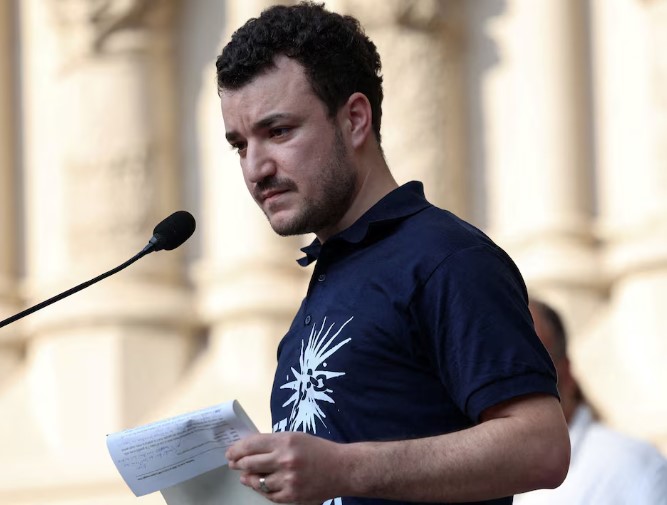A U.S. immigration judge ordered Mahmoud Khalil, a pro-Palestinian activist, to deport to either Algeria or Syria. The decision came after claims that Khalil omitted key information from his green card application, according to court documents released on Wednesday.
U.S. Immigration Judge Orders Khalil to Be Deported
Judge Jamee Comans said that Khalil “willfully misrepresented material fact(s) for the sole purpose of circumventing the immigration process and reducing the likelihood his application would be denied.” This ruling represents a significant development in Khalil’s long-standing legal challenges related to his residency status in the United States.
Khalil, 30, is a permanent U.S. resident of Palestinian descent and a student at Columbia University. Earlier this year, U.S. immigration authorities detained him for more than 100 days while the Trump administration sought to deport him. His detention coincided with the pregnancy of his U.S. citizen wife, and he missed the birth of their child while in custody.
U.S. veteran detained by immigration officers in California over identity despite valid ID
U.S. District Judge Michael Farbiarz in New Jersey released him on June 20 following a court ruling. The judge stated that punishing an individual over a civil immigration matter would be unconstitutional. This ruling temporarily safeguarded Khalil from deportation, allowing him to return to his family and studies while the legal process continued.
Khalil’s Lawyers Challenge Deportation Amid Separate Federal Orders
Following the immigration judge’s ruling, Khalil’s legal team immediately announced plans to appeal the deportation order. They emphasized that separate federal court rulings remain in effect, which currently protect Khalil from immediate deportation or detention while his civil rights case proceeds.
The lawyers submitted a formal letter to the federal court in New Jersey overseeing Khalil’s case. In the letter, they outlined plans to contest Judge Comans’ decision, arguing that it conflicts with previous federal protections. These protections ensure that Khalil cannot be forcibly removed from the U.S. at this time.
Supreme Court lifts limits on Trump’s immigration raids, sparking outrage in California
The legal team’s actions highlight the ongoing tension between civil immigration proceedings and federal court rulings designed to protect individuals’ rights. According to his lawyers, the federal orders take precedence, preventing immediate enforcement of the deportation decision as Khalil’s civil case moves forward.
Khalil’s detention earlier this year and the subsequent deportation order have brought attention to the broader legal questions surrounding the U.S. immigration system. Advocates argue that cases like Khalil’s illustrate the complex overlap between immigration law, civil rights protections, and constitutional limits on governmental authority.
Free Speech and Advocacy Concerns Raised for Khalil
Civil rights groups have widely focused on Khalil’s case and warned that authorities could be linking the deportation attempts to his activism and public statements. Many observers believe the government targeted Khalil because he criticized Israel’s military actions in Gaza and its broader policies in Palestinian territories.
During the Trump administration, authorities often labeled pro-Palestinian protesters as antisemitic or accused them of supporting extremism. Protesters, including some Jewish organizations, argued that these labels unfairly equated criticism of Israel with antisemitism and advocacy for Palestinian rights with extremist activities.
Khalil publicly criticized the deportation order, saying, “It is no surprise that the Trump administration continues to retaliate against me for my exercise of free speech. When their first effort to deport me failed, they fabricated baseless and ridiculous allegations to silence me for speaking out and standing firmly with Palestine, demanding an end to the ongoing genocide.”
Columbia University played a central role in protests last year that called for an end to Israel’s war and urged universities to divest funds from companies that support Israel. These protests and Khalil’s involvement have made his case a focal point for discussions about free speech, student activism, and the boundaries of advocacy in the United States.
Rights groups also raised concerns about potential threats to federal funding for universities where such protests occurred. They warn that these measures could discourage student activism and limit academic freedom, further intensifying debates around civil liberties on college campuses.
